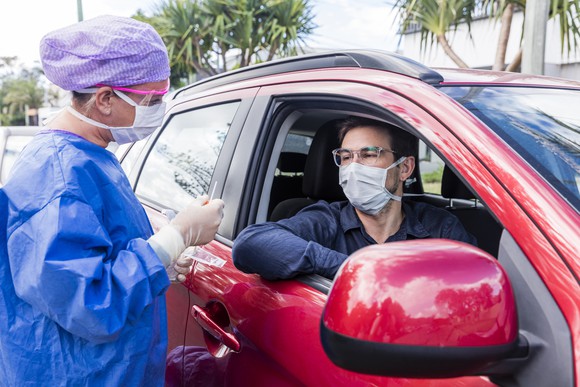As of June 14, the number of COVID-19 cases in the United States had ballooned to over 2.162 million. Of that number, the coronavirus has killed more than 117,000 -- more than a quarter of the pandemic's global death toll.
Now, with the Trump administration intensifying its push to revive economic activity and end the lock-down measures that states undertook to stem the disease's spread, the ability to accurately and widely test people for SARS-CoV-2 infections is only increasing in its importance.
Through testing, healthcare workers will be able to identify and isolate patients with active infections, and slow the spread of the disease. Since March, the Food and Drug Administration has authorized more than 100 COVID-19 diagnostic tests for use. Unfortunately, many of these tests face questions regarding their accuracy in real-world settings, despite looking solid when tested in the laboratory.
Nonetheless, these COVID-19 test-kits are fetching hefty prices at the market, with many laboratories and clinics charging between $95 to $209 per test, and some even higher. If 10 million Americans were tested (a number achieved last month) at these prices, the market opportunity could amount to more than $1 billion. In light of that, this is an opportune moment to take a look at two companies making COVID-19 diagnostic tests, Abbott Laboratories (ABT +0.42%) and Hologic (HOLX +0.01%), and consider which one is the better coronavirus stock to buy now.

Image Source: Getty Images.
The problem with COVID-19 testing
The main problem with disease testing is that a test's accuracy can vary significantly based on the overall prevalence of the condition in the population being tested. For example, a 95% accurate test does not mean it will give an erroneous result 5% of the time; in fact, the error rate can be as high as 50% if the prevalence of the disease among those being tested is very low. The lower the percentage of true positives to be found, the larger the impact that false positives can have on the statistical results.
Almost all of the COVID-19 diagnostics tests were verified in labs. In this process, the tests were required to make correct diagnoses of a limited number of tissue samples, half of which contained SARS-CoV-2, and half of which did not. Regardless of how well they might have performed in those evaluation processes, though, the manufacturers were measuring the accuracy of their tests against a theoretical COVID-19 prevalence of 50% -- which is simply out of touch with the pandemic's reality. (Remember, the lower the prevalence, the less accurate the test will be compared to what is stated.) Hence investors should understand that the advertised accuracy of specific COVID-19 diagnostic tests can be drastically inflated.
Abbott's COVID-19 tests
Abbott's ID Now test for COVID-19 suffers from the problem described above. Last month, it announced the test was 94.7% effective at detecting positive cases (sensitivity) and 98.6% effective at accurately reporting negative results (specificity). The test was also stated to obtain results in as little as 5 to 13 minutes.
With these laboratory findings, the FDA quickly gave emergency use authorization to ID Now. President Trump praised the test, which was used to screen staff at the White House.
However, a preliminary report by New York University found that the test missed 33% to 50% of the cases where patients had COVID-19. Abbott's response to the report asserted that the NYU researchers had used the test incorrectly. Unfortunately, additional studies published by Stanford University, Loyola University, and the Cleveland Clinic have all verified NYU's preliminary report, finding that ID Now is far from accurate.
The findings do not bode well for Abbott. As of June 9, the company had shipped more than 3.3 million ID Now tests to all 50 states, but sales of the test may decline significantly due to concerns about its accuracy.
Fortunately, ID Now is not Abbott's only COVID-19 product. It also markets COVID-19 molecular lab tests and SARS-CoV-2 antibody tests, which determine whether a person has recovered from a COVID-19 infection. Combined, more than 14.7 million of those tests have shipped, and neither one has been flagged for accuracy issues.
Hologic's COVID-19 tests
Hologic's COVID-19 diagnostic test suffers from a problem as well. Its testing platform, the Panther Fusion System, is unique in that it uses bleach in the diagnostic process. Unfortunately, most liquids used to maintain specimen samples while they are being transported to laboratories for analysis contain a chemical that can react with bleach to form toxic cyanide gas.
While Hologic's Panther machines have not been flagged for accuracy issues, the cyanide problem is casting a shadow as the company ramps up production to more than 1 million tests per week. The test is, however, quick and practical, with a turnaround time of under two hours.
Which coronavirus stock is better?
If investors were to make a decision between these two companies solely based on their potential to profit from providing diagnostic testing for COVID-19 (which they shouldn't), then I would argue Abbott Laboratories has the upper hand. Even though its ID Now test is less accurate than one would want such a diagnostic tool to be, the company has compensated for that with its molecular lab and antibody test families, for which its production capacity is more than four times as large as for ID Now. Also, Abbott's overall production capacity ranks above that of Hologic, and the latter's safety hazard may throw cold water on it as a rising test option.
So even though with a P/E of 31, Hologic is a much cheaper stock for investors, I think Abbott, with its P/E of 45 and its robust revenue and dividend growth, will be a better deal for investors, because it will better able meet the needs created by COVID-19.
